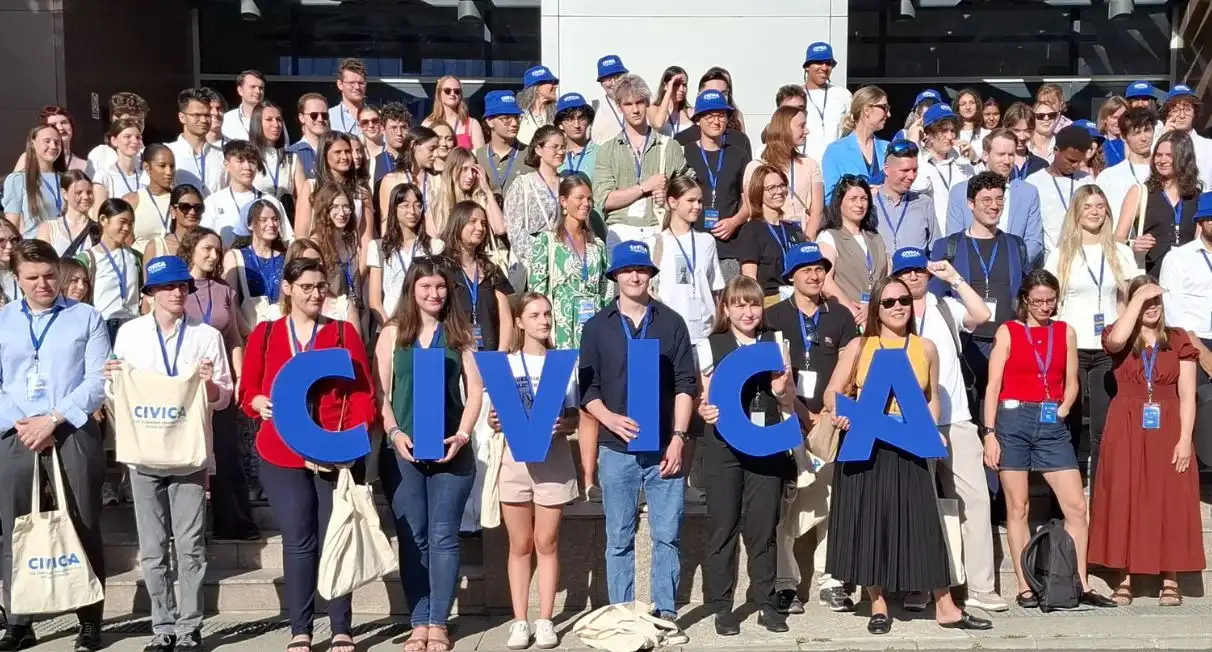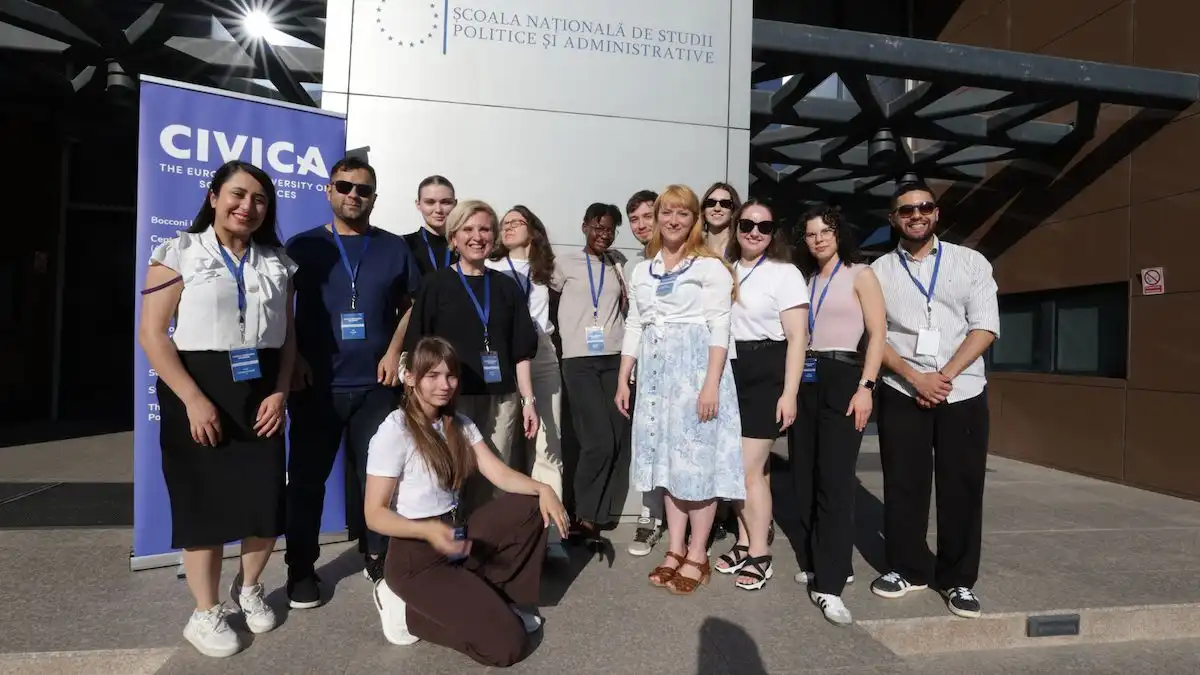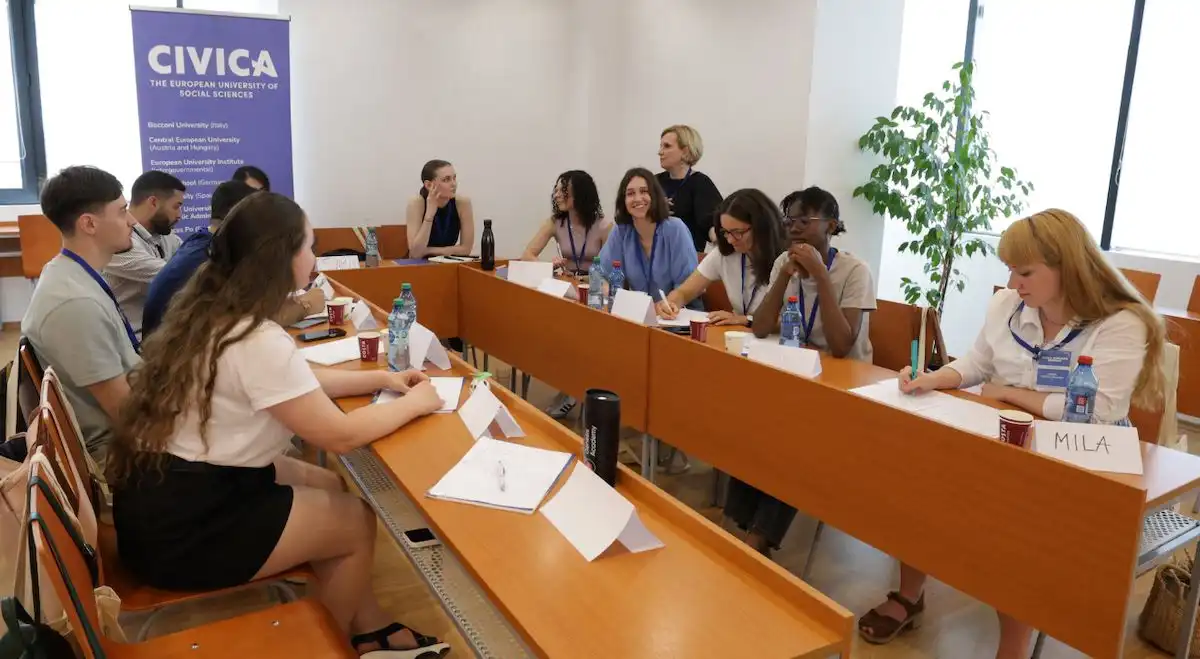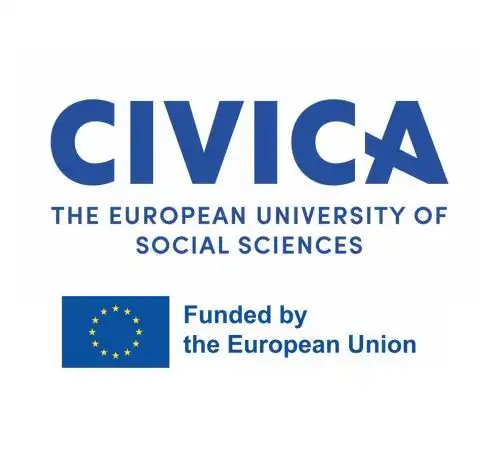Home>A European Summer for Sciences Po Students at Bucharest
15.07.2025
A European Summer for Sciences Po Students at Bucharest

This summer, the place to be was Bucharest, Romania.
Through our European university alliance CIVICA, Sciences Po students were invited to the National University of Political Studies and Public Administration (SNSPA), a landmark in the Romanian academic setting.
There was no excuse to miss this opportunity to learn and discuss with students from all over Europe, as three events were happening the same week (23 to 27 June):
- The CIVICA European Week for Bachelor's students,
- An Honours Seminar, for Master's students,
- A Doctoral Summer School, for PhD researchers.
Let's find out our student's feedback about this series of events.
10 Undergraduates at the CIVICA European Week
10 Bachelor's students from Sciences Po Undergraduate College undertook the journey to Bucharest to take part in the annual CIVICA European Week. This year's topic was “Youth Power! Looking into a More Inclusive Future”.
Every year, this event is hosted by one of the 10 CIVICA partner institutions, Sciences Po welcomed the 2023 edition.

During my case study on an earthquake in Romania, I was able to discuss the floods that had occurred with students from SNSPA, as well as students from Spain. Each of us approached and solved the subject differently, but our goal being the same, we came up with a solution combining all our approaches.
Visiting Bucharest with two Romanian students, Chira and Camelia, was also wonderful. Throughout the visit, they told us about the history of the city, its origins, and its famous landmarks.
At the end of the trip, I felt that when you share the same values, you can come together and build something. I learned to work as a team, to find my place, to speak up even when I don't share the same opinion, to defend my ideas. But also, and above all, I learned to listen to what others have to offer, and therefore to reconsider some of my own ideas and points of view.
I would like to carry out the showcase assignment of my CIVICA Engage Track on the changing economic models in Europe, examining what is desired and supported by certain parties, as well as what could be considered in the future in the context of the current environmental and social crisis. My goal is to understand how different actors can work together to rethink the economic models of European and national institutions in EU countries.
This week required patience and open-mindedness. I discovered local institutions and participants from diverse backgrounds. My curiosity was constantly on the alert, without ever losing its critical perspective, including when it came to my own prejudices and opinions.
I would like to deepen my reflection through further research on the inclusivity of young people in politics, particularly on how they feel. Indeed, it was the voices and opinions of the participants themselves that stimulated me during this week. I believe I should keep in touch with some of them.
For the CIVICA Engage Track showcase assignment, I would like to write a short anthropological essay, using an analytical approach that I discovered at Sciences Po, and based on the methodical observation of social facts. In line with my Civic Learning Programme, my theme will focus on the relationship between info-anxiety (explored during this week) and eco-anxiety, as it often hinders young people's engagement.
This week highlighted the value of asking young people to shape public policies and get involved in their development, thus addressing the many blind spots in existing policies. This call to action, even on issues that may not seem as particularly relevant to young people at first glance, is very exciting.
Visiting the Palace of the Parliament in Bucharest was particularly impressive, because of its architecture and of the round table discussion that took place there, involving political decision-makers. Although, the limited time frame left me a little frustrated as to the level and details of the exchanges.
Bringing together a panel of students from numerous European universities, to have them live and work together, was extremely valuable. It highlighted the many similarities between educational programmes from different parts of Europe, acting as bridges for dialogue and mutual understanding. As a result, we all felt a strong sense of belonging. The fact that this week was funded by the European Union also makes this union more tangible.
Our Master's Students at the SNSPA Honours Seminar
Every year, Sciences Po students enrolled in one of our graduate schools can attend the CIVICA Honours Seminars.
These one-week immersive and intensive seminars offer students a unique opportunity to engage with crucial global topics through interdisciplinary and transnational approaches.

Held under the coordination of Professor Dr. Florina Pinzaru, the SNSPA Honours Seminar was entitled “Strategic Integration, Managing Organisational Sustainability and Digital Transformation”.
During the week, we visited various political and cultural sites (Piata Obor market, Parliament Palace), which allowed us to immerse ourselves in Romanian culture. The activity that made the biggest impression on me was our visit to f(n), a Romanian NGO that builds low-cost passive houses. During this visit, we spent the afternoon in one of the NGO's passive houses. We took part in group workshops on cooperation (the prisoner's dilemma) and decision-making (simulated climate action). These activities were both entertaining and realistic.
The afternoon spent with the association made a big impression on me: I realised that environmental commitment and social inclusion can be combined, even in countries where sustainable housing is not a priority.
On a personal level, this seminar helped me develop teamwork, communication, and cooperation skills in an international context. Academically, I was able to deepen my knowledge of sustainable development and digitalisation. More specifically, this experience allowed me to compare my theoretical knowledge with the reality on the field and to put it into perspective through a different cultural context.
The PhD Researchers Attended a Doctoral Summer School
Three PhD researchers had the opportunity to meet and share their research work and challenges with other fellow students. They are enrolled in Sciences Po Research School and 2 of our 11 research centres – the Centre for European Studies and Comparative Politics (CEE) and the Centre for International Studies (CERI).

I'm a first-year PhD student in political science, working on citizen’s participation through digital platforms across four cities (Mexico City, Madrid, Paris, Quito), under the supervision of Patrick Le Galès, at the Centre for European Studies and Comparative Politics (CEE). The project is funded by the EU Horizon/Marie Curie scholarships.
Several interesting takeaways come to mind, ranging from a quick “crash course” into how to use some online tools to get a sense of trending topics in public opinion, to how to evaluate a “grand strategy" published online against a set of measurable objectives. It was also great to present my work and receive expert feedback on my progress, which helped me resolve some of the doubts I had about the state of my research.
Conversations with two students (one from Sciences Po) stood out to me: both resulted in new ideas for collaboration, and allowed me to see new overlaps between my topics and other areas (or even other disciplines) that I had never considered before.
This summer school was a great opportunity to get in touch with a number of students from across Europe, that I otherwise would not have met. It fostered a sense of community and laid the groundwork, I hope, for future exchanges.

Open house days 2026

Virtual Undergraduate Open House day 2026
Come meet our teams and students at our campuses.
Virtual Graduate Open House day 2026
Meet faculty members, students and representatives and learn more about our 30 Master's programmes.